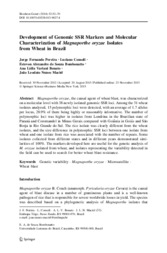Development of genomic SSR markers and molecular characterization of Magnaporthe oryzae isolates from wheat in Brazil.
Development of genomic SSR markers and molecular characterization of Magnaporthe oryzae isolates from wheat in Brazil.
Author(s): PEREIRA, J. F.; CONSOLI, L.; BOMBONATTO, E. A. de S.; BONATO, A. L. V.; MACIEL, J. L. N.
Summary: Magnaporthe oryzae, the causal agent of wheat blast, was characterized on a molecular level with 38 newly isolated genomic SSR loci. Among the 31 wheat isolates analyzed, 15 polymorphic loci were detected, with an average of 1.7 alleles per locus, 28.9% of them being highly or reasonably informative. The number of polymorphic loci was higher in isolates from Londrina in the Brazilian state of Parana´ and Coromandel in Minas Gerais compared with Goiânia in Goiás and São Borja in Rio Grande do Sul. The rice isolate was clearly different from the wheat isolates, and the size difference in polymorphic SSR loci between one isolate from wheat and one isolate from rice was associated with the number of repeats. Some isolates collected from different states and in different years demonstrated similarities of 100%. The markers developed here are useful for the genetic analysis of M. oryzae isolated from wheat, and isolates representing the variability detected in the field can be used to search for better wheat blast resistance.
Publication year: 2014
Types of publication: Journal article
Unit: Embrapa Wheat
Keywords: Trigo
Observation
Some of Embrapa's publications are published as ePub files. To read them, use or download one of the following free software options to your computer or mobile device. Android: Google Play Books; IOS: iBooks; Windows and Linux: Calibre.
Access other publications
Access the Agricultural Research Database (BDPA) to consult Embrapa's full library collection and records.
Visit Embrapa Bookstore to purchase books and other publications sold by Embrapa.

